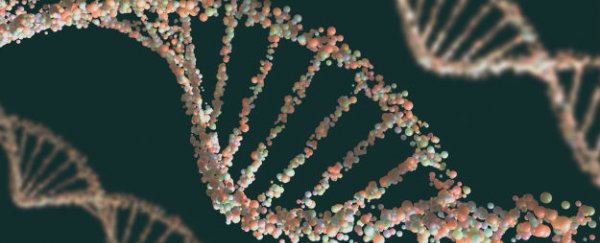Scientists in the UK have created synthetic enzymes - vital catalysts needed to support life - from scratch, using genetic material created in the lab. These enzymes don't contain DNA or RNA, they contain artificial XNA - xeno nucleic acid - and could be used to produce new medical treatments and find life on other planets.
"Our work with XNA shows that there's no fundamental imperative for RNA and DNA to be prerequisites for life," one of the researchers, Philipp Holliger from the Laboratory of Molecular Biology in Cambridge, told Andy Coghlan at New Scientist. Strangely enough, that lab happens to be the same one where, in 1953, the structure of DNA was first discovered by Francis Crick and James Watson.
Three years ago, Holliger's team synthesised their first XNA in the lab. According to Coghlan, they made it using the same bases as DNA and RNA - adenine, thymine, guanine, cytosine and uracil. But they swapped out the sugars onto which each of these bases are usually attached - deoxyribose for DNA and ribose for RNA - with other sugars and molecules that are not found in nature.
Since then, the team has figured out how to fold strands of their synthetic XNA molecules to form enzymes. The XNA enzymes then displayed the ability to cut and paste individual pieces of XNA, which store and copy genetic - or hereditary - information, while also building and breaking down certain molecules as needed.
"Until recently, it was thought that DNA and RNA were the only molecules that could store genetic information and, together with proteins, the only biomolecules able to form enzymes," Holliger told Michelle Roberts at BBC News.
Being able to act as both an enzyme and a store for hereditary information, says New Scientist, are thought to be the first two major steps for creating life. Now all the XNA needs to master is the art of copying itself, just like RNA does.
The team is now working on creating new artificial XNA-based life-forms that could produce new medical treatments that interact with the patient's RNA molecules, or be sent out into the environment to clean up pollutants. The discovery also opens up the possibilities for finding organisms on other planets, knowing that different kinds of molecules are capable of storing genetic information and forming life-supporting enzymes.
"The [discovery] raises the possibility that, if there is life on other planets, it may have sprung up from an entirely different set of molecules, and it widens the possible number of planets that might be able to host life," one of the team, Alex Taylor, told Steve Connor at The Independent.
"Our XNAs are chemically extremely robust and, because they do not occur in nature, they are not recognised by the body's natural degrading enzymes. This might make them an attractive candidate for long-lasting treatments that can disrupt disease-related RNA," Holliger added.
The research has been published in the current edition of Nature.
Sources: New Scientist, The Independent, BBC News
